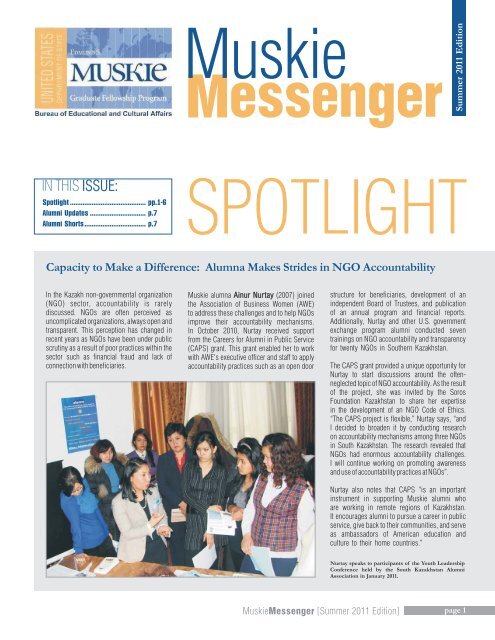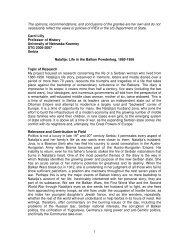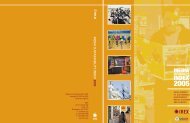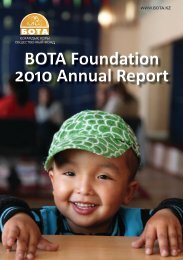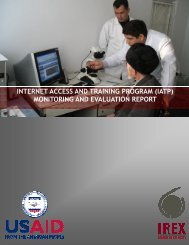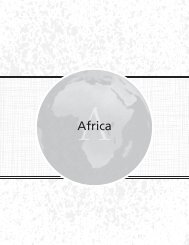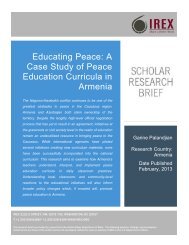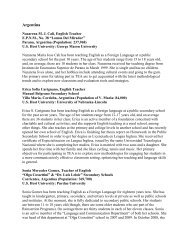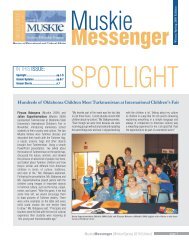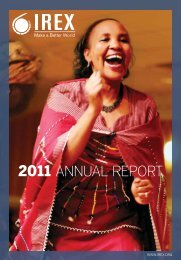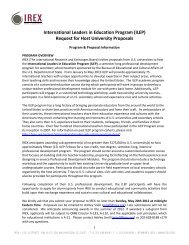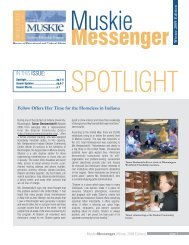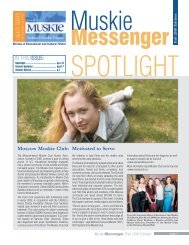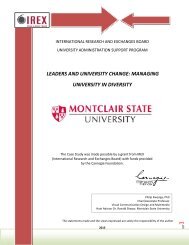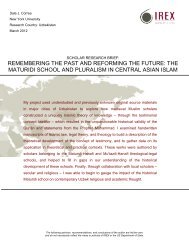Muskie Messenger Summer 2011 - IREX
Muskie Messenger Summer 2011 - IREX
Muskie Messenger Summer 2011 - IREX
Create successful ePaper yourself
Turn your PDF publications into a flip-book with our unique Google optimized e-Paper software.
<strong>Muskie</strong><br />
<strong>Messenger</strong><br />
<strong>Summer</strong> <strong>2011</strong> Edition<br />
IN THIS ISSUE:<br />
Spotlight .......................................... pp.1-6<br />
Alumni Updates ............................... p.7<br />
Alumni Shorts.................................. p.7<br />
SPOTLIGHT<br />
Capacity to Make a Difference: Alumna Makes Strides in NGO Accountability<br />
In the Kazakh non-governmental organization<br />
(NGO) sector, accountability is rarely<br />
discussed. NGOs are often perceived as<br />
uncomplicated organizations, always open and<br />
transparent. This perception has changed in<br />
recent years as NGOs have been under public<br />
scrutiny as a result of poor practices within the<br />
sector such as financial fraud and lack of<br />
connection with beneficiaries.<br />
<strong>Muskie</strong> alumna Ainur Nurtay (2007) joined<br />
the Association of Business Women (AWE)<br />
to address these challenges and to help NGOs<br />
improve their accountability mechanisms.<br />
In October 2010, Nurtay received support<br />
from the Careers for Alumni in Public Service<br />
(CAPS) grant. This grant enabled her to work<br />
with AWE's executive officer and staff to apply<br />
accountability practices such as an open door<br />
structure for beneficiaries, development of an<br />
independent Board of Trustees, and publication<br />
of an annual program and financial reports.<br />
Additionally, Nurtay and other U.S. government<br />
exchange program alumni conducted seven<br />
trainings on NGO accountability and transparency<br />
for twenty NGOs in Southern Kazakhstan.<br />
The CAPS grant provided a unique opportunity for<br />
Nurtay to start discussions around the oftenneglected<br />
topic of NGO accountability. As the result<br />
of the project, she was invited by the Soros<br />
Foundation Kazakhstan to share her expertise<br />
in the development of an NGO Code of Ethics.<br />
“The CAPS project is flexible,” Nurtay says, “and<br />
I decided to broaden it by conducting research<br />
on accountability mechanisms among three NGOs<br />
in South Kazakhstan. The research revealed that<br />
NGOs had enormous accountability challenges.<br />
I will continue working on promoting awareness<br />
and use of accountability practices at NGOs”.<br />
Nurtay also notes that CAPS “is an important<br />
instrument in supporting <strong>Muskie</strong> alumni who<br />
are working in remote regions of Kazakhstan.<br />
It encourages alumni to pursue a career in public<br />
service, give back to their communities, and serve<br />
as ambassadors of American education and<br />
culture to their home countries.”<br />
Nurtay speaks to participants of the Youth Leadership<br />
Conference held by the South Kazakhstan Alumni<br />
Association in January <strong>2011</strong>.<br />
<strong>Muskie</strong> <strong>Messenger</strong> [<strong>Summer</strong> <strong>2011</strong> Edition]<br />
page 1
SPOTLIGHT<br />
Strengthening Foster Care<br />
for Georgian Children<br />
<strong>Muskie</strong> alumni in Georgia recently established the first<br />
Georgian Foster Care Organization (GFCO) within the framework<br />
of an advocacy project funded by the European Union<br />
Delegation in Georgia.<br />
“GFCO, which currently boasts nearly 100 members nationwide,<br />
unites foster parents from all over Georgia who help<br />
ensure that vulnerable children who lack parental care<br />
have the opportunity to grow up in a safe, caring family<br />
environment,” says Maya Mateshvili<br />
(<strong>Muskie</strong> 2006).<br />
“The main goal of establishing the GFCO was to protect<br />
the interests and rights of the foster parents and the children<br />
in their care, as foster care is a relatively new concept for<br />
Georgia and lacks adequate support from the state.”<br />
Mateshvili recently joined the Georgian branch of the UKbased<br />
international NGO EveryChild, headed by Andro<br />
Dadiani<br />
(<strong>Muskie</strong> 2002). Making a transition from managing<br />
public relations at the UN World Health Organization to being<br />
in charge of a children's rights advocacy project for an NGO<br />
has been a rewarding yet challenging career move. “Being a<br />
mom myself, I naturally care about child welfare,” Mateshvili<br />
says. “So when at one of the <strong>Muskie</strong> Alumni Association of<br />
Georgia (MAAG) board meetings Andro told me about<br />
EveryChild's efforts to give children living in institutions the<br />
opportunity of being placed in a family-like environment by<br />
strengthening alternative child care services, I knew I wanted<br />
to make my contribution to this good cause.”<br />
Mateshvili and Dadiani conducted several meetings with over 100<br />
non-kinship foster caregivers in the capital city of Tbilisi as well as<br />
in the regions to convey the goals, structure and membership terms<br />
of the GFCO to its prospective members.<br />
Recognizing the trauma and damage caused to children who<br />
reside in institutional care, the Government of Georgia has<br />
made a commitment to close down all remaining large scale<br />
residential care institutions (orphanages) in the country over<br />
the next two years. Although it is widely thought that the best<br />
solution is to reintegrate children with their biological<br />
families, there is also a considerable need to develop<br />
alternative child care options, such as foster care, for those<br />
children who cannot immediately be reunified with families.<br />
Through GFCO, child care service providers and service<br />
users are mobilized and their capacity is strengthened to<br />
jointly advocate and engage in the policy-making process to<br />
promote and ensure the fulfillment of rights of vulnerable<br />
children and their foster families.<br />
“GFCO will become the main driving force in efforts to<br />
advocate improvements in the levels, variety and quality of<br />
support to children in foster care and their foster parents.<br />
Foster care has proved itself as the best care alternative when<br />
living with biological or extended family is not an option.<br />
We hope that GFCO, with support from EveryChild and other<br />
partners, will be able to achieve real and sustainable<br />
changes to how the government supports and promotes<br />
foster care, amongst other family support and family<br />
substitute services,” says Dadiani.<br />
Balancing Act: Bringing Bike<br />
Safety to Kyrgyzstan<br />
Talant Sultanov<br />
(<strong>Muskie</strong> 2004) and Ulan Shabynov<br />
(<strong>Muskie</strong> 2005) organized the Third Annual Bicycle Run<br />
in Bishkek on May 15, <strong>2011</strong>. Sultanov and Shabynov<br />
became active cyclists during their studies in the U.S. under<br />
the <strong>Muskie</strong> Fellowship and decided to bring the cycling<br />
culture to Kyrgyzstan. The goal of the event was to popularize<br />
bicycles in Kyrgyzstan, to promote healthy lifestyles,<br />
and to enrich cultural life in Bishkek. Nearly 500 people<br />
attended the Bicycle Run, which was supported by the<br />
Bishkek Mayor's office, the American University of Central<br />
Asia (AUCA), and several organizations and companies.<br />
The Bicycle Run finished in the center of Bishkek with<br />
a concert and performances by the bikers.<br />
Shabynov and Sultanov prepare for the race.<br />
Shabynov (third from left) and Sultanov (far right) celebrate with<br />
fellow cyclists including the President of AUCA, Andrew Wachtel<br />
(third from right.)<br />
SPOTLIGHT SPOTLIGHT..........................................................................<br />
page 2<br />
<strong>Muskie</strong> <strong>Messenger</strong> [<strong>Summer</strong> <strong>2011</strong> Edition]
..........................................................................<br />
Engaging Religious Leaders to Combat Human Trafficking<br />
<strong>Muskie</strong> fellows often draw on past professional experiences<br />
when contributing to course discussions and academic<br />
conferences.<br />
Halina Dzesiatava, a 2010 international<br />
affairs fellow, enjoys sharing knowledge gained from her<br />
work at the International Organization for Migration's (IOM)<br />
office in Minsk. This spring, she presented at a conference<br />
on religion, human trafficking, and modern slavery hosted<br />
by the University of Denver and the Iliff School of Theology.<br />
Dzesiatava's experience at the conference tied together<br />
her past professional experience with her studies at Tufts<br />
University and plans for future work at home in Belarus.<br />
Dzesiatava's presentation, “Countering Trafficking in Human<br />
Beings in Belarus: Religious Community Response,”<br />
explored best practices in cooperation with religious<br />
communities to combat human trafficking. By including<br />
examples from Belarus, Moldova and Ukraine, Dzesiatava<br />
engaged the audience in thinking about trafficking issues<br />
in this at-risk region.<br />
In addition to her own presentation, Dzesiatava was also able<br />
to learn from leaders in the field of anti-trafficking and<br />
religious leaders interested in the topic. “The conference<br />
was exactly what I expected it to be and even more,” said<br />
Dzetsiatava. “The participants included religious leaders,<br />
NGO representatives, academia and prominent actors in<br />
the sphere of counter trafficking activities. The presentations<br />
ranged from purely academic papers... to presentations<br />
Nvard Manasian relished seminars and projects as<br />
a <strong>Muskie</strong> fellow, enjoying the challenge of rethinking<br />
the purpose of university education. Born out of that experience,<br />
her blog < http://nvardmanasian.wordpress.com><br />
by outstanding leaders on the necessity of addressing<br />
demand side in trafficking and prostitution.”<br />
Dzesiatava hopes to continue working on anti-trafficking and<br />
migration issues after completing her <strong>Muskie</strong> fellowship.<br />
“Migration is a not a new phenomenon, however, the scale<br />
of world migration is unprecedented now,” explained<br />
Dzesiatava. “Upon my return to Belarus I would like to continue<br />
to pursue my professional interests in this sphere by<br />
contributing to developing effective mechanisms on regulating<br />
legal migration to benefit both migrants and the society.”<br />
Dzesiatava (left) presents with Dr. Ami Angell (right)<br />
Supplementing University Education in Today’s Virtual World<br />
is a one-stop-shop for students in her Global Governance<br />
and Inter-national Organizations course at Yerevan State<br />
Linguistic University.<br />
The site features links to networks and organizations dealing<br />
with Global Governance issues. Manasian encourages students<br />
to analyze the anatomy of learning and diagnose<br />
problems in the course. She encourages students to identify<br />
where the class needs to improve or adapt its pace and depth<br />
to ensure that students can manage the workload, absorb<br />
the main ideas, and reach the course objectives. Manasian<br />
hopes the site will become a tool that transforms the students'<br />
classroom experience, allowing for individualized<br />
learning through blogging and reading. She adds, “We are<br />
at the initial stages of a very long road, which will make<br />
the learning a truly pleasant experience tailored for the<br />
needs and capacities of each individual learner.”<br />
SPOTLIGHT SPOTLIGHT<br />
<strong>Muskie</strong> <strong>Messenger</strong> [<strong>Summer</strong> <strong>2011</strong> Edition]<br />
page 3
SPOTLIGHT SPOTLIGHT<br />
..........................................................................<br />
Pilipenko and Daniela<br />
Learning Through Service<br />
What is the relationship between a lemonade stand, a budget<br />
simulation exercise, and an art-covered rocket? Each of these<br />
community service activities helped 2010 <strong>Muskie</strong> fellows gain<br />
new skills and better understand the community where they<br />
live and study.<br />
ENTRENEURSHIP AND LEMONADE<br />
In Glendale, Arizona, business fellow<br />
Boris Pilipenko<br />
of Kyrgyzstan and international affairs fellow<br />
Ekaterine<br />
Danelia of Georgia served as organizers and mentors for<br />
the Lemonade Day Project. Lemonade Day is a national<br />
initiative to teach youth the basics of entrepreneurship and<br />
business through organizing lemonade sales. In addition to<br />
sharing their knowledge of business, Pilipenko and Danelia<br />
also shared their cultural backgrounds with youth and<br />
Lemonade Day organizers. Naomi Gunnels, City Director<br />
for Lemonade Day, commented that, “The cross-cultural<br />
communication and collaboration was not only valuable<br />
at this time but may increase the impact of [the project's]<br />
principles in the future and throughout the world —<br />
incredible!”<br />
Pilipenko and Danelia felt that the project could be adapted for<br />
use in their home countries. “Teaching entrepreneurship and<br />
financial literacy from an early age is crucial to grow<br />
a strong and vibrant private business sector in any country —<br />
developed or emerging,” said Pilipenko. “Interaction between<br />
students and children and perhaps industry professionals<br />
is essential. Our society needs good role models.”<br />
(right) gather with other Lemonade Day organizers.<br />
COMMUNITY AWARENESS<br />
Rzayeva<br />
and Shalashvili at the Empower Portage event.<br />
Empower Portage is a grassroots initiative designed to reduce<br />
poverty through education, social networking, and community<br />
dialogue.<br />
Maia Shalashvili, an international affairs<br />
fellow from Georgia, and<br />
Gulnay Rzayeva, a business fellow<br />
from Azerbaijan, got involved in the initiative this spring. Both<br />
fellows volunteered at a poverty simulation event where<br />
community members were given the budget for a family living<br />
in poverty and acted out the interactions between the family<br />
and local organizations.<br />
Rzayeva also drew on her studies at Kent State University<br />
to develop a marketing plan for the organization. “I come from<br />
a country that has poverty but to my knowledge we don't have<br />
organizations that do work like Empower Portage,” she said.<br />
“I was interested to see how they are attacking this problem.”<br />
COMMUNITY SERVICE<br />
HIGHLIGHTS<br />
The 2010 <strong>Muskie</strong> cohort<br />
completed more than<br />
5,640 hours of community<br />
service at 136<br />
organizations in 39 states.<br />
71% of supervisors report<br />
fellows participating in<br />
community service<br />
beyond <strong>Muskie</strong> program<br />
requirements.<br />
page 4<br />
<strong>Muskie</strong> <strong>Messenger</strong> [<strong>Summer</strong> <strong>2011</strong> Edition]
..........................................................................<br />
DREAM ROCKET<br />
Liudmilla Potryvaeva, a public policy fellow from Russia,<br />
put her non-profit management experience to work in her<br />
community service for the Dream Rocket Project in Huntsville,<br />
Alabama. The Dream Rocket Project is a collaborative<br />
community art project bringing together youth from communities<br />
around the world to create 8,000 fiber panels<br />
to wrap the Saturn V Moon Rocket. Potryvaeva has worked<br />
to encourage submissions on the “Dare to Dream” theme<br />
from Russian youth.<br />
Potryvaeva enjoyed working with the Huntsville community<br />
and was inspired by the international scale of the project,<br />
which has already brought together submissions from 19<br />
countries. “Although I have enough experience of working<br />
in non-profit organizations in Russia, no one project was so<br />
exciting to me before," said Potryvaeva. “It makes us to go<br />
beyond our daily routine activity, and it really inspires<br />
to dream.”<br />
Two Russian girls display their contribution to the Dream Rocket.<br />
“Zhanna is an incredible<br />
asset to the Boys & Girls<br />
Club! The kids have<br />
definitely benefited from<br />
having her teach them<br />
about her home country<br />
and culture.”<br />
Rebecca Forman of Boys and Girls<br />
Club of Binghamton, describing<br />
Zhanna Harutyunyan, SUNY-<br />
Binghamton public administration<br />
fellow from Armenia.<br />
“Marianna assisted<br />
greatly with marketing<br />
efforts and community<br />
volunteerism. She was<br />
very helpful and reliable.<br />
She was invaluable.”<br />
William Gilmore of Arlington Parks<br />
and Recreation, describing Marianna<br />
Tanina, University of Texas<br />
Arlington public policy fellow from<br />
Tajikistan.<br />
BUILDING MUTUAL UNDERSTANDING<br />
92% of community service supervisors intend to continue professional<br />
contact with the <strong>Muskie</strong> fellow in the future.<br />
88% of supervisors say that hosting a fellow increased their<br />
organization's understanding of the fellow's home community.<br />
<strong>Muskie</strong> <strong>Messenger</strong> [<strong>Summer</strong> <strong>2011</strong> Edition]<br />
SPOTLIGHT SPOTLIGHT<br />
page 5SPOTLIGHT
SPOTLIGHT SPOTLIGHT<br />
....................................................................<br />
Communication in Crisis<br />
Tariyel Jalalli (<strong>Muskie</strong> 2007) received a research fellowship<br />
from the Norwegian Institute of International Affairs<br />
to examine a case study of regional flooding which took place<br />
in spring 2010 in Azerbaijan. The case study examined<br />
how the government implemented communications during<br />
the flood. Jalalli analyzed media coverage of government<br />
activities, official statements and news releases of the<br />
Azerbaijani government and online discussion of the crisis.<br />
His textual analysis of the comments of government officials<br />
and government news releases was conducted to see how<br />
the government framed its own activities. He found that<br />
in 38% of articles, media coverage of the government's<br />
Active Alumnus, Active Citizen<br />
As a winner of British Council's Active Citizens Program<br />
in Azerbaijan, Fargani Aliyev (<strong>Muskie</strong> 2007) was invited to<br />
take part in the Azerbaijani Students and Alumni International<br />
Forum (ASAIF) in Strasbourg, France, in March of this year.<br />
The Forum was attended by several Ministers, Ambassadors<br />
of Azerbaijan, members of Parliament, heads of youth organizations,<br />
Azerbaijani students and alumni abroad, as well as<br />
representatives of European Parliament and Council of<br />
Europe. The fundamental goal of ASAIF's Strasbourg meeting<br />
was to explore and create new means and possibilities to<br />
invest in invaluable young talents of Azerbaijan and stressed<br />
the importance of investing in human capital.<br />
Participation in the forum presented a unique opportunity<br />
for Aliyev to share his ideas with influential members of<br />
Aliyev, far right, with other attendees at ASAIF <strong>2011</strong>.<br />
activities was negative. In 15% of analyzed articles, the media<br />
considered the government responsible for the breakdown<br />
in communications during the time of crisis.<br />
Based on the results of his research, Jalalli prepared policy<br />
recommendations, the main being a creation of a governmental<br />
institution responsible for governmental communications<br />
in Azerbaijan. Jalalli works as a PR consultant at<br />
the Asian Development Bank Azerbaijani Resident Mission<br />
and teaches Organizational Communication/Organizational<br />
Behavior at Khazar University. His research interests<br />
include crisis communications, campaign communication<br />
management, issue management, and social media.<br />
the Azerbaijani government. “As we discussed the future<br />
human capital development strategies in Azerbaijan,<br />
I emphasized the need for opening leadership departments<br />
and launching leadership programs within universities,”<br />
said Aliyev.<br />
Aliyev has also established the Education, Development<br />
and Leadership Center in Khachmaz, a place where active<br />
community members can learn conversational English<br />
through paid courses as well as enjoy free-of-charge<br />
English conversation clubs led by native English speakers,<br />
use Wi-Fi, technical equipment and meeting space.<br />
The Center also provides consulting services and resources<br />
to various NGOs, community groups, unions and individual<br />
citizens on various aspects of developmental issues.<br />
page 6<br />
<strong>Muskie</strong> <strong>Messenger</strong> [<strong>Summer</strong> <strong>2011</strong> Edition]
<strong>Summer</strong> <strong>2011</strong> Edition<br />
<strong>Muskie</strong><br />
<strong>Messenger</strong><br />
ALUMNI<br />
UPDATES<br />
A journalism graduate of the University of Missouri-Columbia, Nikki Kazimova<br />
(<strong>Muskie</strong> 1998) has furthered her education by obtaining cross-cultural training<br />
credentials and working as a trainer delivering cultural orientation programs for<br />
newcomers to Azerbaijan. As a combination of her journalism and cross-cultural<br />
careers, Kazimova wrote a book about Azerbaijan for the “Culture Smart” series<br />
published by the Kuperard Publishers in London in <strong>2011</strong>. In recent months,<br />
she has published newspaper and magazine articles on arts and literature<br />
for Transitions Online and for Echo newspaper and conducted interviews<br />
for the Women's Voices project funded by the Eurasia Partnership Foundation.<br />
Kazimova is also working on a piece of fiction that will soon be posted online<br />
as a part of a cross-border conflict resolution project in the Caucasus.<br />
Kazimova also took the initiative to start a series of public lectures by <strong>Muskie</strong><br />
alumni that has been successfully carried through by the U.S.-Educated<br />
Azerbaijan Alumni Association (AAA). Through the recently launched <strong>Muskie</strong><br />
Academy, alumni were invited to teach courses on the subjects of their expertise<br />
and many responded with fascinating lecture subjects. Delivered from March<br />
to May <strong>2011</strong>, the seminars were popular with students eager to learn from<br />
graduates of American universities.<br />
Nara Martirosyan<br />
(<strong>Muskie</strong> 2005) recently joined Children of Armenia Fund (COAF) as an Education Program Manager.<br />
COAF < www.coafkids.org> implements a comprehensive rural development program in the Baghramyan region of Armavir<br />
marz with a focus on education, healthcare, psychosocial assistance, infrastructure renovation and economic development.<br />
She also received approval for a <strong>Summer</strong> Academy grant proposal made in cooperation with colleagues at Syunik<br />
Benevolent NGO in Vayots Dzor, funded by the Institute for Foreign Cultural Relations with funds from the German Federal<br />
Foreign Office. The project is entitled Establishing a Human Resources Network for Peace in South Caucasus and aims<br />
to prepare young trainers in conflict analysis, conflict management, conflict transformation, conflict mediation and conflict<br />
resolution. The <strong>Summer</strong> Academy will take place during the second half of June and first part of July and will involve young<br />
activists from Armenia and Georgia.<br />
ALUMNI SHORTS · ALUMNI SHORTS · ALUMNI SHORTS ·<br />
ALUMNI<br />
SHORTS<br />
Dimitri Gvindadze (<strong>Muskie</strong><br />
Maksym Klyuchar (<strong>Muskie</strong> Vitaliy Razik<br />
(<strong>Muskie</strong> 2003)<br />
2003) was appointed Minister of<br />
Finance in Georgia. A graduate<br />
of Harvard's Kennedy School<br />
of Government, Gvindadze<br />
previously served as Deputy<br />
Finance Minister.<br />
2009) joined the United Nations<br />
Development Program<br />
in Crimea, Ukraine as a Gender<br />
Coordinator.<br />
was elected Director of the<br />
Regional Charitable Foundation,<br />
Law and Democracy,<br />
a Ukrainian NGO engaged<br />
in human rights protection.<br />
Since his election, Razik has<br />
conducted seminars for public<br />
officials on amendments to the<br />
law on anticorruption.<br />
<strong>Muskie</strong> <strong>Messenger</strong> [<strong>Summer</strong> <strong>2011</strong> Edition]<br />
page 7
The <strong>Muskie</strong><br />
<strong>Messenger</strong> Editorial<br />
Committee:<br />
Sarah Hennessey, International<br />
Research and Exchanges Board (<strong>IREX</strong>)<br />
Natalia Petrova, International<br />
Research and Exchanges Board (<strong>IREX</strong>)<br />
Amy Bernath, International<br />
Research and Exchanges Board (<strong>IREX</strong>)<br />
Design: Elena Vaitkiene<br />
Submission guidelines:<br />
If you are interested in making a submission<br />
to the <strong>Muskie</strong> <strong>Messenger</strong>, please fill out<br />
the online news submission form<br />
<br />
or email muskie_messenger@irex.org<br />
by August 31, <strong>2011</strong>. ECA and <strong>IREX</strong> reserve<br />
the right to edit submission content. Not every<br />
submission will be printed.<br />
ALUMNI OPPORTUNITIES<br />
US Government sponsored exchange alumni are eligible to take part in various Bureau of Educational and Cultural Affairs<br />
(ECA) supported conference and training activities. In addition to events that support large audiences, individual alumni<br />
may apply for small grants that fund the organization of community service activities, conferences, publications, Internetrelated<br />
activities, research trips, training programs, the creation of associations and other activities.<br />
ECA Alumni Programming for Edmund S. <strong>Muskie</strong> Graduate Fellowship<br />
Program Alumni<br />
State Alumni Website: The State Alumni website is an online community by and for alumni of US Government<br />
sponsored exchange and training programs. As of May 2004, the website has over 8,500 registered users. The content of<br />
the site is updated every day and alumni are encouraged to submit information to the website for posting. Features of the<br />
website include: calendar of upcoming alumni events, job listings and career development information, searchable<br />
database of alumni and US host families who have registered at the site, grant opportunity listings, live online<br />
discussions, discussion forum, alumni news, alumni resume database, articles written by alumni, feedback form/online<br />
survey, live online guest speakers, photo gallery, and the Alumni ListServ.<br />
<br />
The ECA Alumni Small Grants Program (ASGP): Alumni may apply for a grant of up to $3,000 to conduct a community<br />
development or professional development project. Fundable project ideas include coordinating a community service<br />
project, launching a pilot program at an NGO or organizing a training program for professional colleagues and/or other<br />
alumni. Applications are accepted on a rolling basis.<br />
<br />
Project Smile: Project Smile is a community development program aimed at helping youth, the elderly and the disabled<br />
in Eurasia. Each grantee will receive up to $250 to perform public service in their home city. Applications will be accepted<br />
on a rolling basis.<br />
<br />
Alumni Events: <strong>IREX</strong> and the US Embassy organize monthly alumni events in all 12 countries of Eurasia. These events<br />
include workshops, conferences, trainings, roundtable discussions, happy hours, movie nights, seminars and lectures.<br />
Larger scale events include job fairs that allow alumni to have their resumes reviewed, learn about the current job market in<br />
their home country, and meet with potential employers. <strong>IREX</strong> local offices and the Embassies encourage alumni to actively<br />
participate in the development and implementation of such events.<br />
MUSKIE FELLOWSHIP<br />
Bureau of Educational<br />
and Cultural Affairs<br />
www.exchanges.state.gov<br />
About the <strong>Muskie</strong> Program<br />
The Edmund S. <strong>Muskie</strong> Graduate Fellowship Program is a program of the Bureau of Educational and Cultural Affairs of<br />
the United States Department of State, and implemented by <strong>IREX</strong> (the International Research and Exchanges Board).<br />
Since 1992, the <strong>Muskie</strong> program has provided opportunities for Master's level study in the United States to more than 4,000<br />
of the most talented citizens from Armenia, Azerbaijan, Belarus, Georgia, Kazakhstan, Kyrgyzstan, Moldova, Russia,<br />
Tajikistan, Turkmenistan, Ukraine, and Uzbekistan.<br />
Through their academic studies, internships, and community service, fellows come in close contact with Americans and<br />
make direct connections with American universities, businesses, social-service organizations, schools, and other<br />
institutions, allowing them to develop a deeper understanding of U.S. values and ideals, such as democratic leadership.<br />
Goals<br />
Promote mutual understanding, build democracy, and foster the transition to market economies in Eurasia through<br />
intensive academic study and professional training. Returning <strong>Muskie</strong> fellows contribute professionally, engage<br />
in democratic processes in their home countries, and strengthen relationships between the U.S. and their home countries.<br />
Additional Information<br />
For more information about the fellowship application process,<br />
please see .<br />
Universities interested in hosting a <strong>Muskie</strong> fellow can visit<br />
<br />
for more information and to join the <strong>Muskie</strong> Host Universities<br />
listserv.<br />
page 8<br />
<strong>Muskie</strong> <strong>Messenger</strong> [<strong>Summer</strong> <strong>2011</strong> Edition]


